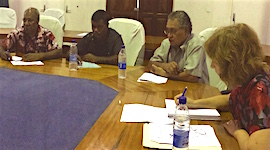Helping Students Become ‘Employers, Not Employees’
Thursday, October 20, 2016
WDI’s Education Initiative will develop a new entrepreneurship curriculum for select universities in Papua New Guinea (PNG) and help faculty members deliver the new instruction to students. The longer-term goal of the project is helping the country nurture its small- and medium-sized business sector and diversify its economy away from reliance on mineral resources.

The project, which represents the first time the WDI Education Initiative has worked in the country, aims to change the mindset of business school students who typically enter public service jobs or work in traditional professions after graduation, such as accounting. WDI Faculty Affiliate Julie Felker, who recently spent a week in PNG for the project, said college students there need to consider a future “where they are employers, not employees.”
Last month Felker, a professor of human resource management at the Zagreb School of Economics and Management, traveled to PNG and met with more than 80 faculty, administrators and students from three universities – University of Papua New Guinea, Pacific Adventist University (PAU) and Divine Word University. Felker also met with some university alumni who went on to become entrepreneurs in New Guinea, and audited two classes at PAU to observe the teaching and learning environment.
“The main purpose of my visit was to understand the faculty’s needs related to an entrepreneurship curriculum, and how students can be best served through entrepreneurship education at PNG universities,” Felker said. “The discussions across all academic units at all three universities were met with sincere enthusiasm and a strong desire to strengthen entrepreneurship education and provide access to students.”
After her visit, Felker summarized her findings on the current status of entrepreneurship education at the universities, as well as the schools’ priorities in the context of local economic conditions. She shared those with fellow WDI Faculty Affiliate Peter Scott, and the two met with WDI Vice President of the Education Initiative Amy Gillett to brainstorm ideas.
The three examined current entrepreneurship courses the universities offer, formed recommendations on how to strengthen them, and provided suggestions on textbooks, cases and other teaching and learning materials.
In December, Scott is scheduled to travel to PNG to deliver a four-day “train-the-teacher” workshop for 35-40 faculty members and administrators that demonstrates how to integrate and teach entrepreneurship in their respective curricula – law, science and the humanities, among others. After the workshop, Scott will get feedback from the participants and make any necessary revisions to the curriculum. A final version will be sent to the universities.
Gillett said the institute is “excited to bring its field-tested entrepreneurship education training curriculum to PNG and to shape this content to meet the needs of the local system.
“This project will help ensure that the country’s university students learn the principles and practices of entrepreneurship and will be well equipped to start sustainable businesses,” she said. “These businesses will fuel economic growth in Papua New Guinea.”
The project is sponsored by the Center for International Private Enterprise (CIPE). WDI collaborated with CIPE on a mentorship training project in Bahrain earlier this year.
The PNG project is one of many entrepreneurship development programs that WDI has spearheaded over the past 12 years. Other recent projects have included training more than 300 women entrepreneurs from throughout Rwanda, and providing a consulting team to help an entrepreneurship service center in Kosovo better serve local entrepreneurs.
“Entrepreneurship development support is a key way that WDI can help advance economies in emerging markets,” Gillett said.
